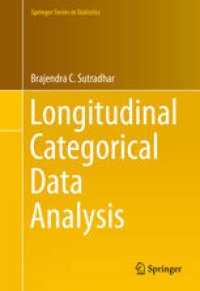
Ebook: Longitudinal Categorical Data Analysis
Author: Brajendra C. Sutradhar (auth.)
- Tags: Statistical Theory and Methods, Statistics for Social Science Behavorial Science Education Public Policy and Law, Statistics for Life Sciences Medicine Health Sciences
- Series: Springer Series in Statistics
- Year: 2014
- Publisher: Springer-Verlag New York
- Edition: 1
- Language: English
- pdf
This is the first book in longitudinal categorical data analysis with parametric correlation models developed based on dynamic relationships among repeated categorical responses. This book is a natural generalization of the longitudinal binary data analysis to the multinomial data setup with more than two categories. Thus, unlike the existing books on cross-sectional categorical data analysis using log linear models, this book uses multinomial probability models both in cross-sectional and longitudinal setups. A theoretical foundation is provided for the analysis of univariate multinomial responses, by developing models systematically for the cases with no covariates as well as categorical covariates, both in cross-sectional and longitudinal setups. In the longitudinal setup, both stationary and non-stationary covariates are considered. These models have also been extended to the bivariate multinomial setup along with suitable covariates. For the inferences, the book uses the generalized quasi-likelihood as well as the exact likelihood approaches.
The book is technically rigorous, and, it also presents illustrations of the statistical analysis of various real life data involving univariate multinomial responses both in cross-sectional and longitudinal setups. This book is written mainly for the graduate students and researchers in statistics and social sciences, among other applied statistics research areas. However, the rest of the book, specifically the chapters from 1 to 3, may also be used for a senior undergraduate course in statistics.
This is the first book in longitudinal categorical data analysis with parametric correlation models developed based on dynamic relationships among repeated categorical responses. This book is a natural generalization of the longitudinal binary data analysis to the multinomial data setup with more than two categories. Thus, unlike the existing books on cross-sectional categorical data analysis using log linear models, this book uses multinomial probability models both in cross-sectional and longitudinal setups. A theoretical foundation is provided for the analysis of univariate multinomial responses, by developing models systematically for the cases with no covariates as well as categorical covariates, both in cross-sectional and longitudinal setups. In the longitudinal setup, both stationary and non-stationary covariates are considered. These models have also been extended to the bivariate multinomial setup along with suitable covariates. For the inferences, the book uses the generalized quasi-likelihood as well as the exact likelihood approaches.
The book is technically rigorous, and, it also presents illustrations of the statistical analysis of various real life data involving univariate multinomial responses both in cross-sectional and longitudinal setups. This book is written mainly for the graduate students and researchers in statistics and social sciences, among other applied statistics research areas. However, the rest of the book, specifically the chapters from 1 to 3, may also be used for a senior undergraduate course in statistics.
Brajendra Sutradhar is a University Research Professor at Memorial University in St. John's, Canada. He is author of the book Dynamic Mixed Models for Familial Longitudinal Data, published in 2011 by Springer, New York. Also, he edited the special issue of the Canadian Journal of Statistics (2010, Vol. 38, June Issue, John Wiley) and the Lecture Notes in Statistics (2013, Vol. 211, Springer), with selected papers from two symposiums: ISS-2009 and ISS-2012, respectively.